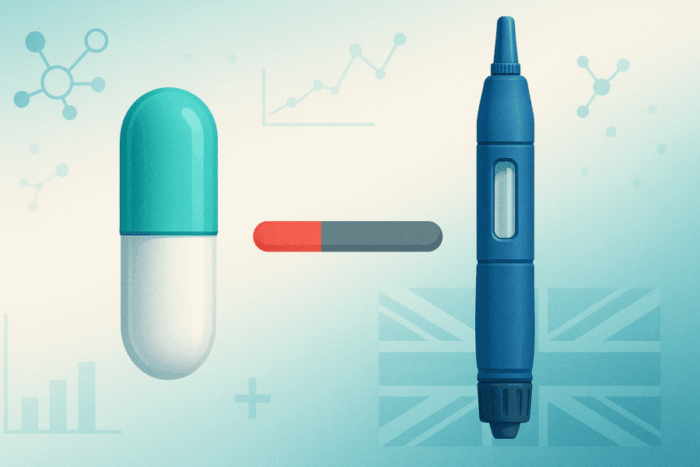Why we’re not there yet with obesity pills – but the future is bright
Peter Paumgardhen | Last update: 13th August 2025
Needle-free weight loss medication is a dream for many. But while new pills are on the way, they still trail behind today’s injectables. Here’s why we’re hopeful – but realistic – about when you might see a true alternative in the UK.

TL;DR
-
Eli Lilly’s new obesity pill, orforglipron, has shown promising results but still falls short of Mounjaro and Wegovy.
-
The pill achieved around 12% weight loss over 72 weeks, compared to about 15% for Wegovy and over 20% for Mounjaro in similar trial timeframes.
-
Many people didn’t make it to the end of the trial, especially on the highest dose, where more than 24 out of every 100 stopped taking the pill.
-
Regulatory submissions are expected at the end of 2025, with a possible UK launch in 2026 – but a truly competitive pill is unlikely before 2028.
-
Pills have huge advantages over injections, so research and development will continue at pace.
What’s just happened?
Eli Lilly has just unveiled the latest results for its much-anticipated oral obesity pill, orforglipron—something we first flagged back in May in our article “This new daily weight loss pill could be a game changer!”. It remains one of the most advanced oral GLP-1 therapies in the pipeline, but the new data left investors and health experts a touch underwhelmed.
The pill achieved 11.5% more weight loss than the placebo group over 72 weeks (Investing.com) — in other words, people on the pill lost significantly more weight than those not taking it, but still fell short of the 13–15% many had expected. This is notably less than the results seen in Mounjaro and Wegovy studies, where patients often lose 15–20% of their starting weight.
Even more concerning was how many people stopped taking the pill before the trial ended – about 24 out of every 100 on the highest dose, and mid-teen percentages on lower doses. By comparison, far fewer people drop out in Mounjaro and Wegovy trials.
Why pills are still so exciting
Despite the numbers, pills offer clear advantages:
-
No needles – a big plus for anyone hesitant about injections.
-
Easier storage – unlike injectables, pills don’t need refrigeration, which makes them simpler to handle for pharmacies and patients.
-
Potentially more consistent availability – because pills are easier to ship and restock, pharmacies and online providers may be able to keep them in supply more reliably, even when demand is high or manufacturing is under pressure.
SlimrChat has already highlighted this potential in our Next generation weight loss drugs: what you need to know piece, where we noted Novo Nordisk’s high-dose daily semaglutide pill (the same ingredient as Wegovy) offers up to 15 % weight loss over 64 weeks, with the convenience of oral delivery rather than injections.
When could you get one in the UK?
Lilly plans to file for regulatory approval for orforglipron by the end of 2025, meaning a potential global and UK launch in 2026, according to a Reuters report on the company’s latest update.
However, approval doesn’t mean instant parity with injectables. To truly rival Mounjaro and Wegovy, a pill would need:
-
Comparable weight loss results
-
Lower dropout rates
-
Real-world data showing consistent benefits
Given where the science stands today, SlimrChat’s view is that 2028 is the earliest we might see a genuinely competitive oral alternative widely available through the NHS or private UK providers.
The SlimrChat take
Pills for weight loss are clearly the future, but we’re not there yet. Orforglipron shows that progress is real, but the performance gap compared to today’s jabs remains too wide for most users to consider switching.
That said, the sheer convenience of a pill means companies will keep pushing the science forward. In the coming years, we expect this gap to close – and when it does, it could transform treatment options for millions.
Until then, injectables like Mounjaro and Wegovy remain the gold standard for GLP-1 weight loss in the UK. But make no mistake: the pill revolution is coming.